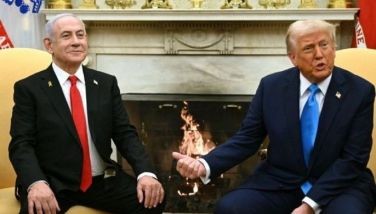US, EU push for Russia sanctions over Ukraine
BRUSSELS — The United States and the European Union are preparing economic and diplomatic sanctions against Russia unless Moscow deescalates the crisis in Ukraine and pulls its troops on the Crimean peninsula back to its barracks.
The U.S. has already halted military and economic talks as it weighs further punitive measures. Secretary of State John Kerry said Tuesday in Kiev that Russia must pull back or "our partners will have absolutely no choice but to join us to continue to expand upon steps we have taken in recent days in order to isolate Russia politically, diplomatically and economically."
The EU appears to be treading more cautiously, but the bloc's 28 leaders are set to decide on initial sanctions at an emergency meeting in Brussels Thursday.
Here's a glance on agreed sanctions, further measures under consideration in the U.S. and the EU and their impact:
STOP TALKING AND COOPERATING
The U.S. and the European members of the G8 — Germany, Britain, Italy and France — have halted all preparations for a planned June summit in Russia's Black Sea resort Sochi.
Washington has suspended talks with Russia on an economic agreement and the Pentagon has suspended exercises and other activities with the Russian military.
EU foreign ministers on Monday said their leaders are likely to halt long-running talks with Russia on visa liberalization and negotiations on further economic cooperation. Russia is keen on the talks to secure visa-free travel for its citizens to the 28-nation EU, the country's biggest trade partner.
But influential European officials such as German Foreign Minister Frank-Walter Steinmeier say not sanctions but even more talks with Russia and diplomacy are needed now to resolve the crisis.
ECONOMIC SANCTIONS
U.S. officials traveling with Kerry said the administration is considering imposing economic sanctions as soon as this week, but gave no details.
Ed Royce, chairman of the U.S. House Foreign Affairs Committee, has called for "debilitating" economic measures. He said the U.S. and Europe should act collectively to threaten the Russian stock market, economy and ruble if Russia doesn't withdraw from Crimea.
The chairman of the Senate Foreign Relations Committee, Bob Menendez, also said talks were ongoing with the administration on possible sanctions ranging from "visa bans and asset freezes, to the suspension of military cooperation and sales."
EU foreign ministers on Monday threatened Russia with "targeted measures," which typically include banning key officials and business leaders from traveling to the 28-nation bloc and freezing any of their assets held there. Some analysts speculate the EU could also hit Russia by blocking state-controlled banks' access to its financial market.
Such steps would be fairly easy to do, but could harm Europe's economic interest. Russian investors hold assets worth billions in European banks, not least in Britain and Cyprus — two financial hubs popular with Russians.
Britain is especially protective of London's huge financial industry, and would be reluctant to take actions which undermine the sector just as the country is crawling out of recession. A British government document caught Monday by a camera outside the prime minister's office said Britain "should not support for now trade sanctions or close London's financial center to Russians," even though Foreign Secretary William Hague said Tuesday all options were still open.
STOP ENERGY IMPORTS
Tougher economic sanctions could target Russia's energy sector. The trade in oil and gas accounts for around 60 percent of Russia's exports and half of its government revenues, according to analysts from Capital Economics, making Moscow vulnerable to sanctions, at least in theory. It would be easy for the U.S., but very difficult and thus unlikely for the Europeans.
Russia is the EU's third-largest trading partner, mainly because of oil and gas imports, with the EU being its biggest gas consumer. Germany, for example, gets 35 percent of its supplies from Russia.
Russia, in turn, buys everything from machinery to cars from Europe, its biggest trading partner, with exports to Russia totaling 123 billion euros ($170 billion) in 2012. For the U.S., Russia isn't among the top 15 trading partners.
President Vladimir Putin "likely believes that the West would not be able to agree on biting economic sanctions against Russia; indeed, the EU nations have such deep trade relations with Russia that they would resist," said Eurasia Group analyst Cliff Kupchan.
However, when the political cost of cheap and steady energy supplies eventually outweighed the economic benefits, Europe in 2012 agreed to ban imports of gas and oil from Iran to pressure Tehran to come clear on its nuclear program.
HOW EASY TO ACT?
The United States is free to act on its own, though it obviously would prefer to build a united response from its allies.
Any tough EU decisions will require unanimity among the leaders of the bloc's 28 sovereign nations, and that appears far from guaranteed, for fears of hurting their economies and being shut off from Russian gas supplies.
WHO WOULD BE MOST HURT BY SANCTIONS?
Both the U.S. and the EU would feel a pinch if they impose sanctions.
The fallout for Washington would likely be primarily political as it needs to work with Russia, a veto-wielding permanent U.N. Security Council member, on resolving international crises ranging from the civil war in Syria to Iran's nuclear program.
Since the military escalation over the weekend, Russia felt a quick economic jolt as its stock market and the currency plunged. Analysts say a full-scale economic escalation — which very few expect at this stage — would be most painful to Russia, which already experiences sluggish growth.
For the EU, the economic cost would likely also be very significant because of their deep trade ties with Russia.
"Europe would be hurt," Dutch Foreign Minister Frans Timmermans acknowledged Monday. "Those consequences will be bad for everyone, but for Russia they will be far worse than for the EU."
- Latest
- Trending





























